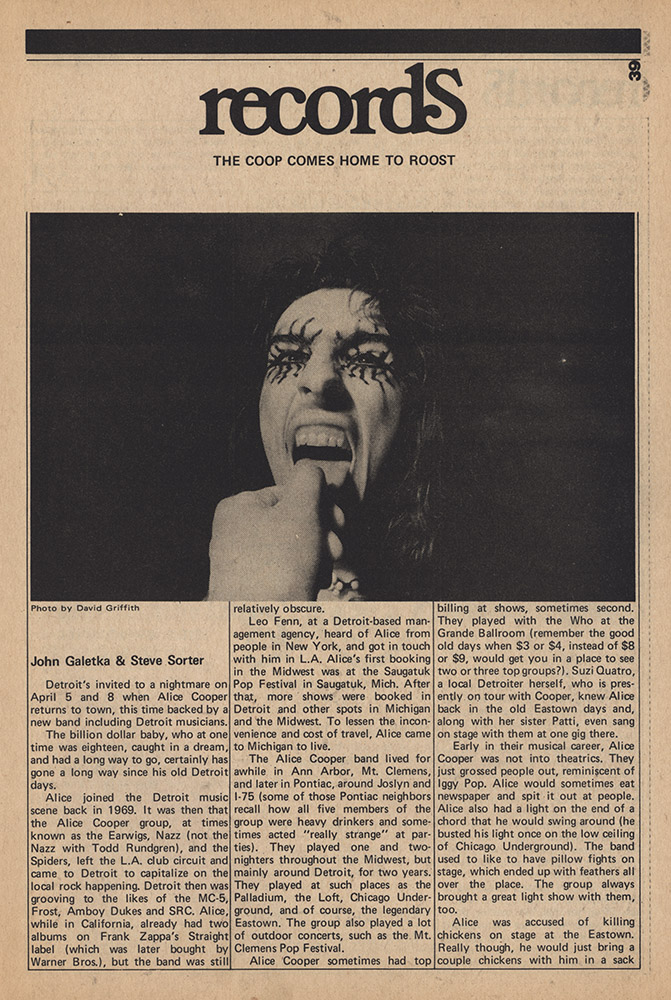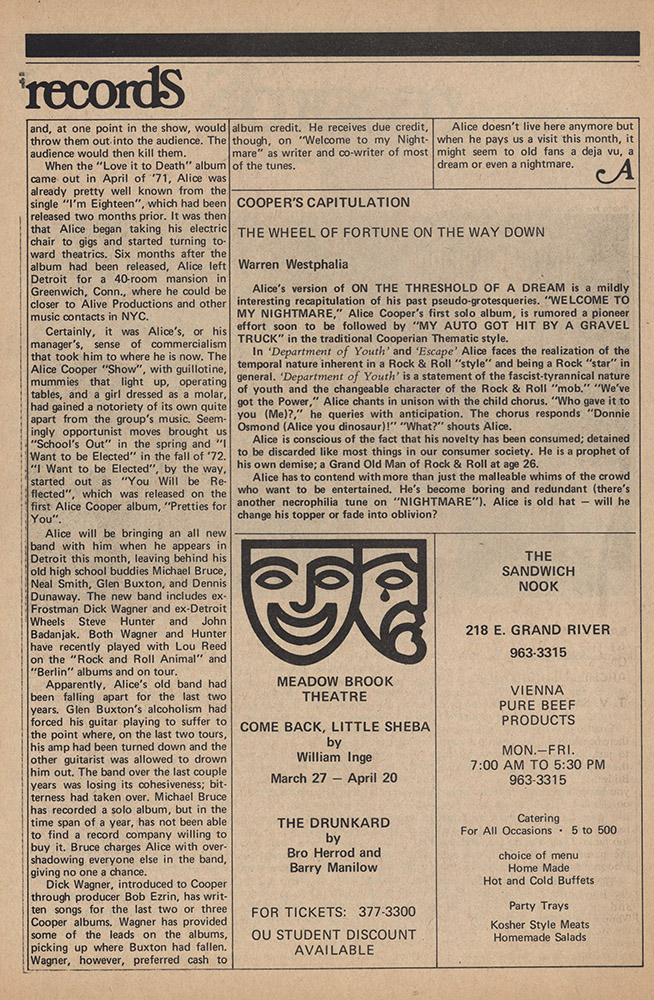Article Database

Art Beat
April 1975
The Coop Comes Home To Roost
Author: John Galetka & Steve Sorter
Detroit's invited to a nightmare on April 5 and 8 when Alice Cooper returns to town, this time backed by a new band including Detroit musicians.
The billion dollar baby, who at one time was eighteen, caught in a dream, and had a long way to go, certainly has gone a long way since his old Detroit days.
Alice joined the Detroit music scene back in 1969. It was then that the Alice Cooper group, at times known as the Earwigs, Nazz (not Nazz with Todd Rundgren), and the Spiders, left the L.A. club circuit and came to Detroit to capitalize on the local rock happening. Detroit then was grooving to the likes of the MC-5, Frost, Amboy Dukes, and SRC. Alice, while in California, already had two albums on Frank Zappa's Straight label (which was later bought by Warner Bros.), but the band was still relatively obscure.
Leo Fenn, at a Detroit-based management agency, heard of Alice from people in New York, and got in touch with him in L.A. Alice's first booking in the Midwest was at the Saugatuck Pop Festival in Saugatuck, Mich. After that, more shows were booked in Detroit and other spots in Michigan and the Midwest. To lessen the inconvenience and cost of travel, Alice came to Michigan to live.
The Alice Cooper band lived awhile in Ann Arbor, Mt. Clemens, and later in Pontiac, around Joslyn and 1-75 (some of those Pontiac neighbors recall how all five members of the group were heavy drinkers and sometimes acted "really strange" at parties). They played on and two-nighters throughout the Midwest, but mainly around Detroit, for two years. They played at such places as the Palladium, the Loft, Chicago Underground, and of course, the legendary Eastown. The group also played a lot of outdoor concerts, such as the Mt. Clemens Pop Festival.
Alice Cooper sometimes had top billing at shows, sometimes second. They played with the Who at the Grande Ballroom (remember the good old days when $3 or $4, instead of $8 or $9, would get you in a place to see two or three top groups?). Suzi Quatro, a local Detroiter herself, who is presently on tour with Cooper, knew Alice back in the old Eastown days and, along with her sister Patti, even sang on stage with them at one gig there.
Early in their musical career, Alice Cooper was not into theatrics. They just grossed people out, reminiscent of Iggy Pop. Alice would sometimes eat newspaper and spit it out at people. Alice also had a light on the end of a chord that he would swing around (he busted his light once on a low ceiling of Chicago Underground). The band used to like to have pillow fights on stage, which ended up with feathers all over the place. The group always brought a great light show with them, too.
Alice was accused of killing chickens on stage at the Eastown. Really though, he would just bring a couple chickens with him in a sack and, at one point in the show, would throw them out into the audience. The audience would kill them.
When the "Love it to Death" album came out in April of '71, Alice was already pretty well known from the single "I'm Eighteen", which had been released two months prior. It was then that Alice began taking his electric chair to gigs and started turning towards theatrics. Six months after the album had been released, ALice left Detroit for a 40-room mansion in Greenwich, Conn., where he could be closer to Alive Productions and other music contracts in NYC.
Certainly, it was Alice's, or his manager's, sense of commercialism that took him to where he is now. The Alice Cooper "Show", with guillotine, mummies that light up, operating tables, and a girl dressed as a molar, had gained a notoriety of its own quite apart from the group's music. Seemingly opportunistic moves brought us "School's Out" in the spring and "I Want to be Elected" in the fall of '72. "I Want to be Elected", but the way, started out as "You Will be Reflected", which was released on the first Alice Cooper album, "Pretties For You".
Alice will be bringing an all new band with him when he appears in Detroit this month, leaving behind his old high school buddies Michael Bruce, Neal Smith, Glen Buxton, and Dennis Dunaway. The new band includes ex-Frostman Dick Wagner and ex-Detroit Wheels Steve Hunter and Jon Badanjak. Both Wagner and Hunter have recently played with Lou Reed on the "Rock and Roll Animal" and "Berlin" albums and tour.
Apparently, Alice's old band had been falling apart for the last two years. Glen Buxton's alcoholism had forced his guitar playing to suffer to the point where, on the last two tours, his amp had been turned down and the other guitarist was allowed to drown him out. The band over the last couple of years was losing its cohesiveness; bitterness had taken over. Michael Bruce has recorded a solo album, but in the time span of a year, has not been able to find a record company willing to buy it. Bruce charges Alice with over-shadowing everyone else in the band, giving no one a chance.
Dick Wagner, introduced to Cooper through producer Bob Ezrin, has written ten songs for the last two or three Cooper albums. Wagner has provided some of the leads on the albums, picking up where Buxton had fallen. Wagner, however, preferred cash to album credit. He receives due credit, though, on "Welcome to my Nightmare" as writer and co-writer of most of the tunes.
Alice doesn't live here anymore but when he pays us a visit this month, it might seem to old fans a deja vu, a dream or even a nightmare.
Cooper's Capitulation
The Wheel of Fortune on the Way Down
Author: Warren Westphalia
Alice's version of ON THE THRESHOLD OF A DREAM is a mildly interesting recapitulation of his past pseudo-grotesqueries. "WELCOME TO MY NIGHTMARE," Alice's first solo album, is rumored a pioneer effort soon to be followed by "MY AUTO GOT HIT BY A GRAVEL TRUCK" in the traditional Cooperian Thematic style.
In 'Department of Youth' and 'Escape' Alice faces the realization of the temporal nature inherent in a Rock & Roll "style" and being a Rock "star" in general. 'Department of Youth' is a statement of the fascist-tyrannical nature of youth and the changeable character of the Rock & Roll "mob." "We've got the Power," Alice chants in unison with the child chorus. "Who gave it to you (Me?)," he queries with anticipation. The chorus responds "Donnie Osmond (Alice your dinosaur)!" "What?" shouts Alice.
Alice is conscious of the fact that his novelty has been consumed; detained to be discarded like most things in our consumer society. He is a prophet of his own demise; a Grand Old Man or Rock & Roll at age 26.
Alice has to contend with more than just the malleable whims of the crowd who want to be entertained. He's become boring and redundant (there's another necrophilia tune on "NIGHTMARE"). Alice is old hat — will he change his topper or fade to oblivion?
(From the collection of Anders Mossberg)




